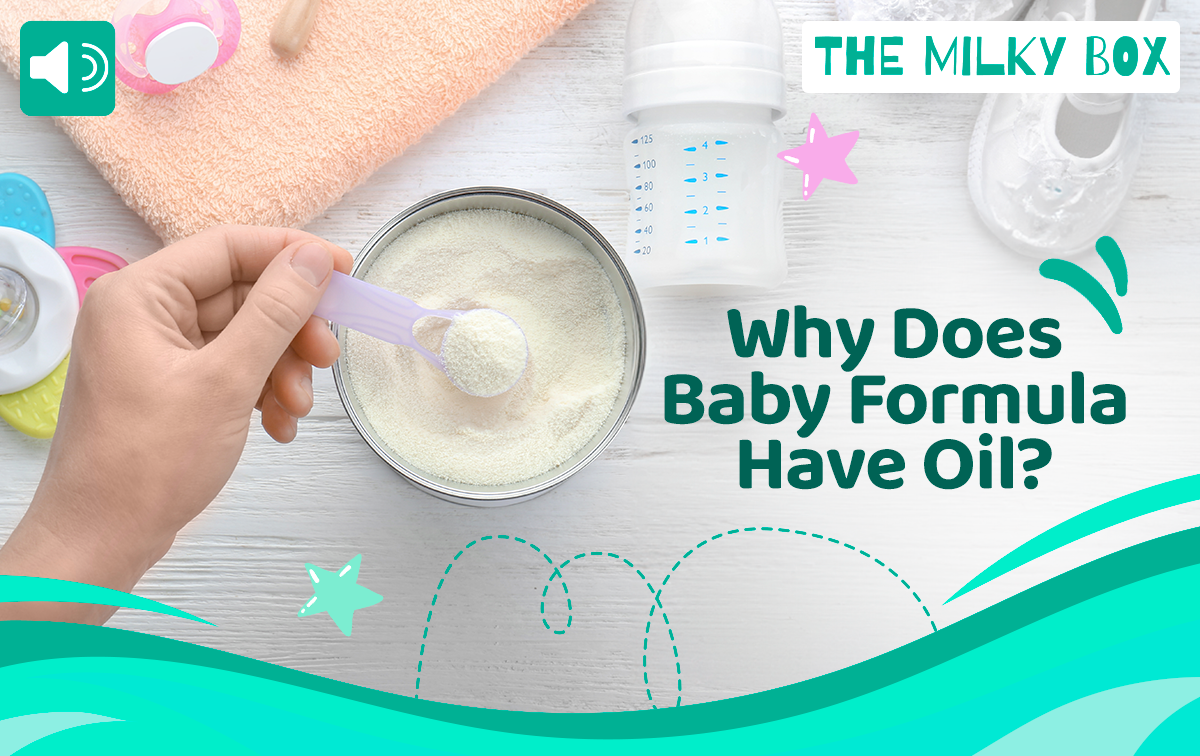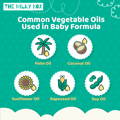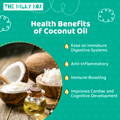Yes! There is no particular rule that forbids making this switch. You just need a little patience, as goat milk will need to be introduced slowly to be gentle with your baby’s digestive tract. It is suggested to start by mixing their current formula or milk with your preferred goat’s milk. You’ll gradually increase the amount of goat's milk over five days until the transition is complete.
Why Does Baby Formula Have Oil?
By: Dr. Maria Cerino - October 10, 2023 - 10 Minute Read

When it comes to choosing the right formula for your baby, there is no denying that going organic is key. But a quick look at the label shows a different story. Why is oil at the top of the ingredient list? Isn’t palm oil bad for our health?
In this article, we’ll do a comprehensive breakdown of the importance of oil in baby formula. We’ll also explore the different formula options on the market and their respective oil content. Ready? Let’s begin!
Table of Contents:
1. Why Vegetable Oil in Baby Formula?
2. Do All Baby Formulas Contain Vegetable Oil?
3. Types of Vegetable Oils Found in Baby Formula
4. Fat Sources in Baby Formula & Breast Milk
5. Does Palm Oil in Baby Formula Cause Constipation?
6. Why Is Palm Oil Used in Baby Formula?
7. Sunflower Oil in Baby Formula
8. Rapeseed Oil in Baby Formulas
10. Coconut Oil in Baby Formula
11. Finding the Best Natural Formula for Babies
12. The Safest Formula for Infants
13. Milk Based Baby Formula Options Without Palm Oil
14. Conclusion
15. Frequently Asked Questions
Why Vegetable Oil in Baby Formula?
The story goes like this: infant formula was created to mimic human milk, down to recreating its original composition to ensure proper baby nutrition.
When scientists analyzed the composition of human milk, they found that around 50% of human milk’s calories come from naturally produced palmitic oil.
Fulfilling your baby's caloric needs requires basing baby formula on fat and carbohydrates, hence the need to find a replacement: palm oil and corn syrup.
Recently, there have been major health concerns regarding the continuous presence of palm oil in our everyday foods, so it is no surprise we, as parents, are concerned too when looking at those labels.
Do All Baby Formulas Contain Vegetable Oil?
All baby formulas contain vegetable oil to meet caloric requirements, to put it plainly. There's one principal element to it: Fat is necessary to enable fat-soluble vitamin absorption and fat provides key calories to help with growth and weight gain. Essential nutrients like vitamin B need a certain amount of fat content in your baby's diet to facilitate absorption and then metabolization by the body.
Without fat in their diets, their neurological development would be affected, as Vitamin B is indispensable for nerve and brain function.
From birth, a baby's digestive system is equipped with the appropriate enzymes and mechanisms to digest fat and make the most of these macronutrients. So, don't be scared of including it in their diets.
Types of Vegetable Oils Found in Baby Formula
You can find a lot of variety when it comes to oils used by formula manufacturers. This can vary due to blend-ability, taste, availability, and cost to produce. There are, of course, formulas that focus on a singular type of oil, but it’s more common in the market to see a varied blend of oils.
However, here are the most common oils you’ll find when checking those labels:
● Palm oil
● Coconut Oil
● Sunflower Oil
● Rapeseed Oil
● Soy Oil

Fat Sources in Baby Formula & Breast Milk
Human milk's fat is characterized by its high contents of palmitic and oleic acids. The former is heavily concentrated in the 2-position and the latter in the 1- and 3-positions of the triglycerides.
This is, essentially, what provides enough energy and enzyme cofactors for your baby’s appropriate neurological development.
One remarkable fact about mom: The fatty acid composition of milk fat varies somewhat with the composition of the mother’s diet, particularly the fatty acids that it supplies. It adapts, too, to best cover your baby’s milk requirements.
That natural chemical composition is exactly why palm oil was one of the first replacements ever used in baby formula. After all, the gold standard was to resemble mom’s milk as much as possible.
It provides palmitic acid, although scientists found out later that the way palmitic acid from oil is broken down differs vastly from breast milks. It forms an insoluble soap that binds with free calcium ions to create those harder stools that we’ve heard from many testimonies.
Does Palm Oil in Baby Formula Cause Constipation?
There are many valid concerns about palm olein oil in formulas related to digestive issues and the formulation of “soaps” that inhibit calcium absorption. These soaps don't cause any harm or risk; rather, they just show that some calcium and palmitic acid aren't being absorbed. As part of regular bowel movement, the body expels the unabsorbed calcium and palmitic acid.
In a study made by the European Society for Paediatric Gastroenterology, Hepatology, and Nutrition (ESPGHAN), it was found that the development of calcium soaps, however, has the potential to result in tougher stools or constipation for some infants with extremely sensitive digestive systems, notably those born early.
Here’s where the biggest missing information in the media outlets: It’s much more common to find harder stools in preemies due to the developmental stage of their gastrointestinal system.
This is nothing to worry about, but it’s important to make the distinction from early on so we can choose the most suitable formula possible.
Why Is Palm Oil Used in Baby Formula?
Palm oil’s chemical content resembles the mother’s natural palmitic acid, which is naturally over half of the content of the mother’s breast milk. It’s a straightforward way to mimic breast milk’s natural ingredients so your baby can enjoy a rich, nutritious diet.
Its use has skyrocketed in the past two decades, which aligns with our consumption of palm oil as adults. It’s everywhere: baked goods, chips, canned foods, and so much more.
Here’s the reason: it’s cost-effective, easier to produce in vast quantities, and easy to preserve. The high yield of palm oil allows for more affordable production of infant milk for formula manufacturers, making it more accessible.
Palmitic Acid from Palm Oil vs. Palmitic Acid from Breast Milk
It has been proven throughout the years that palm oil is safe for healthy babies. Crude palm oil is used because it’s a reliable source of palmitic acid, which is one of the most abundant fatty acids found in human milk. Formula makers use palm oil to model a similar fatty acid composition to breast milk for formula-fed infants.
The biggest difference between both types of palmitic acid is its absorbability. Palmitic acid from breast milk is absorbed much better, which promotes softer stools and no calcium waste.
However, manufacturers correct this by adding more calcium to compensate for the difficulties the body experiences absorbing calcium when palm oil is present.
Many generations before us routinely relied on palm oil-based formulas and contributed to the growth of healthy babies, now adults. Nowadays, it’s still used in many organic formulas, often blended with other oils to create a better, enriched formula.
One great aspect of Palm Oil that no one talks about: it yields an incredible cost-effective formula, which contributes to maintaining affordability all year round.
Do All Baby Formulas Contain Palm Oil?
If you’re skeptical about palm oil, don’t fret. In recent years, many great companies like Kendamil, Bebe M, Jovie Goat, and Nannycare have committed to making amazing, clean formulas that don’t rely on palm oil.
Particularly, many formulas based on goat milk have shifted away from traditional oils, making it an excellent choice for parents of those with sensitive stomachs and dietary preferences that don’t necessarily include palm oil
What Are Some Alternatives to Palm Oil in Infant Formula?
The most commonly used oils in the baby formula industry are Coconut Oil, Sunflower Oil, Soy Oil, and Rapeseed Oil.

Sunflower Oil in Baby Formula
Sunflower oil is one of the most commonly used oils in baby formula because it is a reliable source of essential fatty acids, particularly linoleic acid, which is important for infant growth and development.
Sunflower oil is also easily digestible and may improve the absorption of fat-soluble vitamins, such as vitamin D and vitamin E.
Additionally, sunflower oil is less likely to cause allergic reactions compared to other oils, such as soybean oil, which is another common oil used in baby formula. It’s cheaper to produce and process, and it contributes to the desired fat content all the same.

Rapeseed Oil in Baby Formulas
Rapeseed oil is known for being confused with Canola oil, a cooking oil you might’ve heard of more frequently. In Europe, the term Rapeseed oil is much more common, and it’s also a commonly used oil for baby formula.
It has a neutral flavor profile and is naturally low in saturated fat and high in unsaturated fat, which is linked to better heart health.
This vegetable is also a major source of Omega 3 & 6. Its organic form is commonly used by top-quality brands to substitute palm oil.

Formula that contains sunflower and rapeseed oil
You can find sunflower and rapeseed oil in most European baby formulas, as they provide the fat and nutrients necessary for development. Here are some of the best examples:
● Lebenswert Stage 1, 2, and 3
● HiPP
● Holle Bio
● Jovie
● Kabrita
● Nannycare Goat Stage 1, 2, and 3
● Löwenzahn Organic Milk Formula 1, 2, and 3
● Bébé M Organic Vegan
Soy Oil in Baby Formula
Soy oil is a highly nutritious ingredient often used in baby formula because of its rich content of essential fatty acids, particularly linoleic acid, which is vital for infant growth and development.
Soy oil is also an excellent vitamin E source, a powerful antioxidant that helps protect cells from damage. It is extracted from soybeans and is commonly used in baby formulas as an emulsifier, a protein and fat source, or both.
The soy protein isolates, and soybean oil used in baby formulas are cost-effective compared to other oils, making soy oil a popular choice in infant formula production.
Soy in Baby Formula
Using soy in infant formulas raises a significant concern regarding its cultivation and processing methods. However, soy oil is commonly utilized as a critical source of essential fats in such formulas. For a considerable period, it was the only approved source. Families can rest assured that soy oil is refined in a way that eliminates any possibly dangerous soy protein.

Coconut Oil in Baby Formula
There was a time when coconut oil rose to the height of health foods, and that was founded.
Coconut oil is an all-natural source of vegetal fat. It’s preferred by some formula manufacturers due to its chemical composition: It is a rich source of medium-chain triglycerides (MCTs), which are easily digestible and can be used by the body for energy.
This is perfect for those sensitive stomachs. It also doesn’t require the body to utilize any of its stored energy to be metabolized, which makes it a perfect option for those suffering from severe malnutrition and malabsorption diseases.
Medium Chain Triglycerides are also believed to have antimicrobial and anti-inflammatory properties, which may benefit the immune system. Kendamil, a leader in organic formula, is one of the primary users of coconut oil in their milk.
Kendamil use it during their process to obtain lauric acid, a type of saturated fatty acid that contains a lot of important antibacterial properties. The type of milk highest in lauric acid is human breast milk, so it’s no wonder they chose to source it from coconuts, creating a perfect natural addition to your everyday formula.

Concerns about Coconut Oil
Coconut oil contains multiple health benefits that can’t be found in other alternatives, which makes it perfect when blended with other nutritious oils such as sunflower and soybean. It’s perfect to create a complete nutritious formula for your little ones.
Another common concern is deforestation caused in the production of coconut oil. These concerns are extremely important as consumers. It encourages us to prefer ethically sourced milks that are conscious about our environmental impact as consumers.
While it is true that coconut oil requires to be grown in areas where a great percentage of the world’s biodiversity has found a home, it is also true that the European Union is continually active when it comes to sustainability, creating strict regulations that ensure sustainability for the European Manufacturers.
Traceability is enforced by importers to ensure it is ethically sourced from the root. When picking out a coconut oil-based formula, it’s important to be on the lookout for European formulas that follow these regulations, and furthermore, they believe in sourcing all their ingredients ethically, such as Bebe M, Kabrita, Kendamil & Premibio.
Finding the Best Natural Formula for Babies
The best natural formula is going to vary from household to household. Depending on your individual concerns and beliefs, it’s up to each parent to make an informed choice, always respecting their baby’s needs and pediatric guidelines and goals for age-appropriate development.
However, it’s safe to say we need to take note of the following when picking out our formula. You should always go for:
● Organic certified
● Made by a reputable brand.
● No added sugars
● No artificial flavoring
● No colorings or additives
● Science-backed
● Tailored to their age and particular digestive needs.
If you're looking for a comprehensive guide on organic baby formula, please check out this 2023 Complete Best Organic Baby Formula Guide on all high-quality European baby formulas available in the US with just a few clicks.
The Safest Formula for Infants
A fantastic alternative to meet the required fat content is organic dairy fat. A lot of formulas rely 100% on vegetable oils for their products. It’s cheaper, easier to produce, and requires less traceability. However, some brands have chosen to source the necessary fat from organic dairy milk.
This has proven to be a step in the right direction: It provides excellent taste and nutrient profile. When it comes to sensitive stomachs, it’s often easier to digest due to its similarity with human milk; their fat profiles are almost identical.
Whole cows’ milk is also a good provider of B vitamins, including B2 (riboflavin) and B12, and the minerals iodine, potassium, and phosphorus.
The latest trends in European pediatrics suggest that adding complex lipids and milk fat globule (MFG) membranes to vegetable oil-based infant formula could help to enhance infant development and reduce infections.
If more companies like Kendamil, HiPP, Holle, Lebenswert, Löwenzahn & Premibio keep making an effort to change the old, established patterns of relying solely on vegetable oil, we could very well be on our way to finding that much-desired balance between high-quality nutrition and attainability for parents out there.
Milk Based Baby Formula Options Without Palm Oil
There are fantastic options on the market that don’t contain palm oil but rely on the amazing benefits that Milk-based formulas have to offer. European brands like Premibio and Kendamil are perfect examples:
● Premibio Prémilait: This French formula specializes in innovation. It is made from chemical-free organic agriculture and manufacturing and contains plant-based DHA. Fortified with minerals and vitamins that will ensure your baby’s nutrition is complete.
● Kendamil: A leader in its field, Kendamil is a British organic formula made to the highest ethical and quality standards on the market. Made with 100% full milk cream, it’s guaranteed to provide the best nutrition available on the market.
Conclusion
After this comprehensive walkthrough on all oils used in baby formula manufacturing, it is safe to say there is a vast amount of information regarding each different oil.
Hard evidence seems to point towards dairy milk sources of fat being healthier for babies when faced with pure oil-based formulas. However, one thing is sure: we can’t get rid of them completely.
Vegetable oils are necessary to provide many nutrients and amino acids that have huge roles in the neurological development of children. The importance lies in checking the blend of oils and their percentage to ensure all the nutrients possible are extracted from fats.
Parents must take a deep dive and find what feels best for their particular stance. As always, consulting your qualified health practitioner should be a priority when picking out a baby formula to ensure it lines up with the desired childhood nutrition and developmental goals.
At The Milky Box, we understand that feeding your little one can be a daunting task. That's why we are here to help you along your feeding journey. Our team of experienced formula experts is available to answer any questions you may have, whether it's about the ingredients used or each brand's commitment to sustainability - we're here to support you every step of the way.
Frequently Asked Questions
Can I switch from palm oil-based formula to goat milk formula?
Are Palm Oil Free Formulas available in the US?
Yes, although many retailers don’t carry them, there are specialized online stores that offer an amazingly wide selection of options so you can pick what feels best and get it delivered straight to your home.
How do I know my formula of choice is helping my baby grow accordingly?
Keeping an eye on your infant’s growth is going to be one of the most important tasks you will be trusted with as a parent. You need to be on top of every pediatrician’s appointment and keep track of their height and weight to ensure their feeding quantities and the quality of their food is best to follow the national growth charts.
Does the brand name matter when it comes to baby formula?
Not necessarily. It’s more important to ensure the ingredient list doesn’t contain any harmful ingredients, such as added sugars or artificial flavorings. It’s more relevant to check for the quality of the fat source.
Disclaimer:
Please be aware that this information is based on general trends in babies, and it is not medical advice. Your doctor should be your first source of information and advice when considering any changes to your child’s formula and when choosing your child’s formula. Always consult your pediatrician before making any decisions about your child’s diet or if you notice any changes in your child.
Breastfeeding is the best nutrition for your baby because breast milk provides your child with all the essential nutrients they need for growth and development. Please consult your pediatrician if your child requires supplemental feeding.

Dr. Maria Cerino is a medical doctor and a researcher from Mexico, her works being published in prestigious journals like the American Journal of Human Biology among others. As a medical writer, Dr. Cerino focuses on infant nutrition and healthy neurological development in infants and children. In her free time, she enjoys going on walks, watching indie films, and cooking at home.
Read Next:
Reviewed by Dr. Eric Wood, ND, MA

Dr. Wood is a licensed naturopathic doctor, with a doctorate degree from the Canadian College of Naturopathic Medicine in Toronto, Canada. He received his post-graduation certification in Mind Body Medicine at Harvard University.
With 15 years of experience, Dr. Wood is an Associate Professor of Holistic Nutrition at the American College of Health Sciences in Portland, Oregon. Dr. Wood is an educator, clinician, author, media figure, consultant, and owns his own holistic (naturopathic) medical practice in Ft. Lauderdale, Florida. Dr. Wood is currently researching and drafting books on cancer and pediatrics.
Outside of the medical profession, Dr. Wood loves singing with the Miami Lyric Opera and is an avid musician in South Florida. He also loves spending time with his wife and kids.

